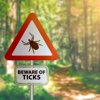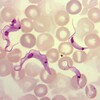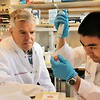-

Bioinvent säljer rättigheter till immunterapi för 287 miljoner
Svenska Bioinvent säljer sin andel av rättigheterna till immunterapikandidaten mezagitamab för upp till 30 miljoner dollar, motsvarande omkring 287 miljoner kronor.
-

After the threat of tariffs – Novartis invests 230 billion in the USA
Pharmaceutical giant Novartis plans to invest 23 billion dollarsover the next five years to expand its production in the USA. The goal is for all medicines destined for the US market to be produced within the country.
-

Korbinian Löbmann leads scientific meeting on drug formulation: High activity in the field
Korbinian Löbmann has moderated New Updates in Drug Formulation & Bioavailability several times before. Now he is once again taking on the scientific meeting. Life Science Sweden reached out to him.
-

A tiny animal with great importance
From the mythical Ganges River to the less sacred, but considerably cleaner waters in KI's aquariums in Solna. The little zebrafish has made an unconscious career – as an increasingly important model organism in medical research.
-

FDA approves new cystic fibrosis therapy
A new treatment for cystic fibrosis has been approved by the U.S. Food and Drug Administration (FDA).
-

Large study on milk: Risky for women but not for men
The risk of ischemic heart disease (IHD) and acute myocardial infarction (MI) increased for women with milk intake levels higher than 2 glasses per day, while no such association was found in men, according to a new large Swedish study.
-

Investigations against AstraZeneca: ”Chinese interests may be behind them”
Why are there several investigations against AstraZeneca employees in China right now? Life Science Sweden continues to seek answers.
-

Utredningarna mot Astra Zeneca: ”Kinesiska intressen kan ligga bakom”
Varför pågår det flera utredningar mot Astra Zeneca-anställda i Kina just nu? Life Science Sweden fortsätter att nysta i härvan.
-

This years Nobel prize in medicine – “Changed the understanding of how genes are controlled”
This year’s Nobel Prize in Physiology or Medicine goes to the discovery that small RNA molecules, known as microRNAs, control how genes are regulated. Understanding the mechanism has changed our view of human biology and evolution, says KI Professor András Simon.
-

Moderna fälls efter 20 000-kronorserbjudande till barn
Moderna kritiseras i Storbritannien för ett felaktigt meddelande där barn erbjöds 1 500 pund, motsvarande över 20 000 kronor, för deltagande i en klinisk studie av bolagets covid-vaccin.
-

Study names with an attitude – more important than you might think
Ironman, T-rex, Star-Trek. Popcorn, Proper, Scout. Nope, these are neither fantasy films nor dog names. They’re the names of ongoing cancer studies in Sweden.
-

Dynamic Code köper konkursat bolag
Diagnostikföretaget Dynamic Code förvärvar Findout Diagnostics som i juli försattes i konkurs.
-

The first Lyme disease vaccine faces a delay
Pfizer and Valneva’s Lyme disease vaccine, which could be the first of its kind, is facing delays of about a year. The reason is problems at trial sites in the United States, which have forced the companies to drop half of the participants in an ongoing Phase III study.
-

Medtech-bolag utreds av Finansinspektionen om insiderinformation
Finansinspektionen har startat en utredning kring medtech-bolaget Aegirbios hantering av insiderinformation.
-

Column: ”Cheating with pea flowers and does it matter whether you are right?”
Is it possible to forgive shortcuts or outright cheating in science - if it turns out that the researcher was ultimately right? Anna Törner discuss this topic in a column.
-

AI baserad på språkalgoritm skapade nya fungerande proteiner
Inte ens proteiner går säkra för språkrobotarna. I det senaste numret av Nature Biotechnology presenterades språkmodellen Progen som, enligt forskarna bakom studien, lärt sig semantiken och grammatiken i proteinernas språk.
-

Individual DNA passport could result in fewer drug side effects
You may be required to show a DNA passport when you pick up medicines at the pharmacy in the future. According to a new study, patients might suffer 30% fewer side effects if the drug treatment is adapted to their genes.
-

Snabbväxare under pandemin – nu tvingas diagnostikbolaget skära ned
Det minskade behovet av testning efter pandemin slår hårt mot diagnostikbolaget Dynamic Code, som nu aviserar ett sparpaket. Ett 20-tal medarbetare berörs, och samtidigt pausas företagets satsning i Tyskland.
-

Dynamic Codes vd slutar
Diagnostikföretaget Dynamic Codes vd Louise Nylén har beslutat sig för att lämna sin post.
-

A growing industry in Denmark: “One new life science company a week”
The life science sector in eastern Denmark continues to grow in the number of employees, as well as the number of companies. An emerging problem is the shortage of labour, a new report reveals.
-

Anna Törner: To kill your darlings
Hopes were high when Anna Törner and her colleague started a study on a dietary supplement that seemed unbelievably good. “Enthusiastically, we dreamed of exciting results and perhaps a publication in a high-impact journal,” she writes in a column.
-

Noxious parasite forms hybrids and deceives the immune system
The small parasite Trypanosoma cruzi has a nasty ability to cause serious illness. Researchers at the Karolinska Institutet have now mapped its ability to deceive the immune system by forming new variants that are mixtures of different strains.
-

Investments worth 40 billion in the Öresund region – “A huge investment wave”
A new report reveals that medical companies in the Oresund region are investing like never before.
-

Elicera develops CAR-T against solid tumours – may become the first in the world
Today, there are five EU-approved CAR-T therapies, all focused on different types of blood cancer, but no one has yet succeeded in making the method work against solid tumours. At Gothenburg-based Elicera, they are working relentlessly to succeed in that field as well. “It is the largest field, and the potential is enormous,” says the company’s CEO Jamal El-Mosleh.